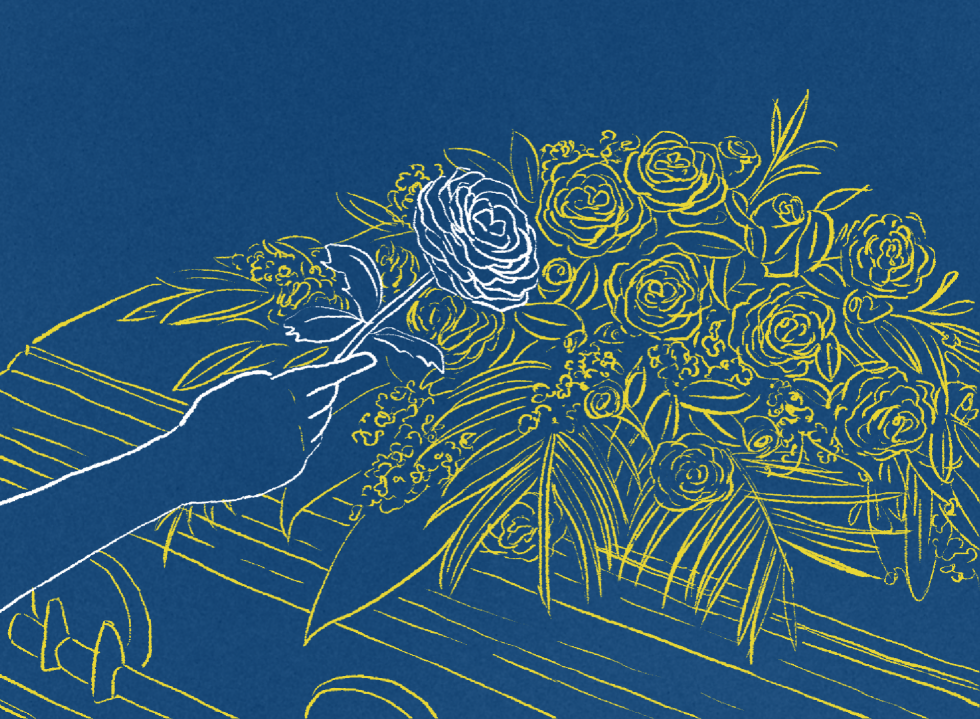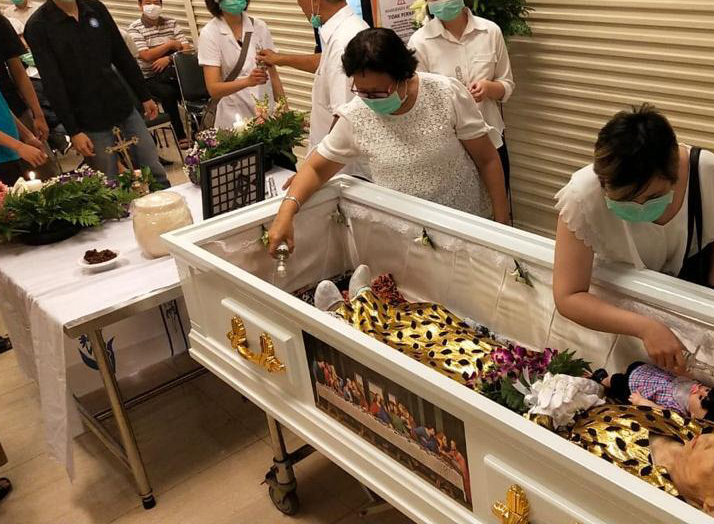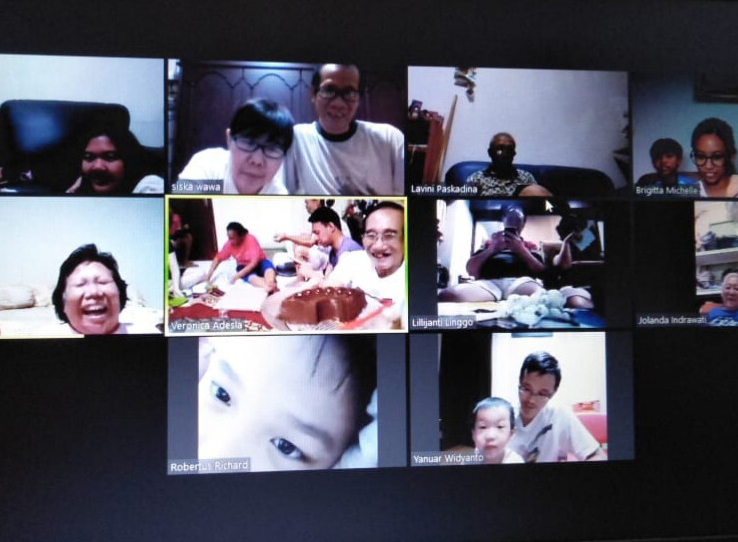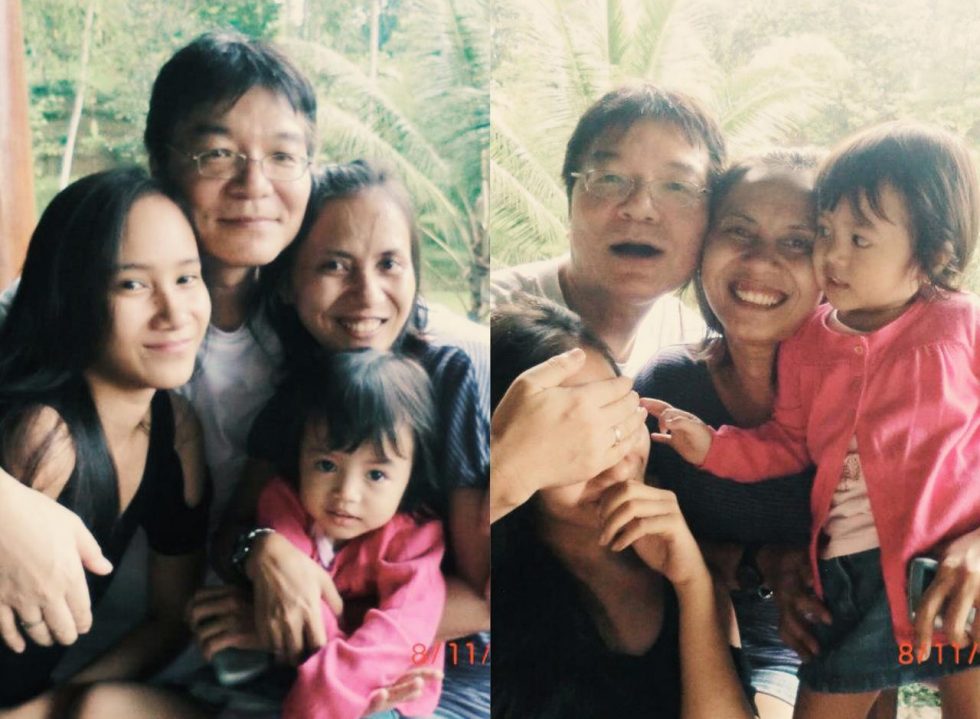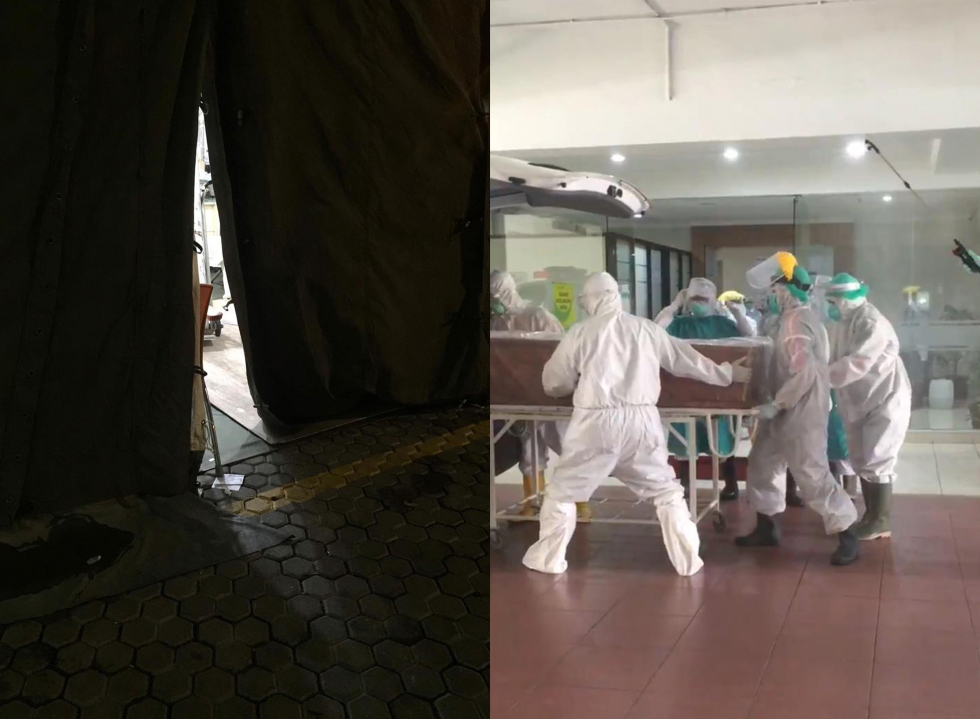In our effort to make social distancing less monotonous, REMOTELY is a special series from Manual Jakarta where we roll out comforting and practical articles to keep you company and motivated during this period of self-isolation.
–
Afrodite Aisyah remembered staying up the whole night in front of the hospital’s isolation tent where her father, Kiyotaka Shinkawa, was treated. From outside, all she could see was her father’s feet, along with nurses in protective garb.
Earlier that day on Sunday, March 29, Kiyotaka was admitted to Rumah Sakit Puri Cinere. He had been coughing and having headaches while also shivering, all symptoms that point to the novel virus. Steam therapy helped initially, but it didn’t take long for his condition to worsen.
“A few hours later, my mother told me to go to the hospital immediately,” recounts Aisyah – or also known as Icha. “That’s when I started having this terrible feeling in my heart. When I got there, my father was already placed in a tent with other patients who had the symptoms.”
The morning after, Kiyotaka was moved to an isolation room. Icha recorded the moment on her phone, not knowing it would be the last time she saw him alive. Five days later, Kiyotaka passed away. He was 62.
Loss of normalcy
At the time of writing, the pandemic has taken the lives of over 1,300 people in Indonesia, with fear of second wave infections arriving after Eid celebrations. The cruel toll of COVID-19 deaths has led to the inevitable agony of grief. But the ordeal is made much harder with sweeping restrictions in place.
Many are dying apart from their loved ones, while the bereaved are mourning apart from theirs. In fear of virus transmission, families and friends are robbed of moments like bedside visits and custom rituals to the simplest act of consoling hugs, as many experiences a collective loss of normalcy.
“Mourning is typically expressed through rituals based on a different culture, religion and family traditions,” says Veronica Adesla, a clinical psychologist at Personal Growth Indonesia consulting agency.
“Having these rituals can help transition the bereaved through their grieving period. Under the shadow of the pandemic, however, this cannot be carried out normally. Not being able to send off loved ones can also lead to adverse impacts if not handled thoughtfully.”
In these absences, such grief can dwell, prompting unsettling feelings from guilt to anger. To some, even denial. “These interruptions may make the grief-stricken feel that the deceased is still alive or simply think that the news is not true,” says Veronica, who also lost her 98-year-old grandmother in March during the pandemic. She died of natural causes.
“The PSBB was not in effect at the time, so thankfully, my family and I were able to pay our respects,” recounts Veronica. However, there were still implications that affected the funeral arrangements due to some considerations and restrictions in place.
At the time, Veronica and family held a two-day wake at a funeral home with only direct families, all draped in masks, attending. A cleric almost didn’t make it in fear of the situation, and until today, her grandmother’s ashes are still safely kept as burial at sea is not possible at the moment.
In her efforts to bring back a sense of normalcy, Veronica and family did praying rituals via video conference on the seventh and fortieth day since the passing, but limitations to these are naturally felt.
“Many considerations have affected the effectiveness of death rituals and practices. No matter the efforts, our expression of condolences and sympathies are not delivered and received the way it should be,” she explains.
A goodbye like no other
There are people, like Veronica, who may not be directly affected by the pandemic but still experience its palpable impact. But for someone like Icha, whose direct loss is as isolating as it is regulated, the emotional brunt carries a different weight.
Icha remembers vividly the day her father was laid to rest. It was 10 in the morning when the burial procession began, and Icha was waiting for her father to come out of the isolation room. Soon, six nurses came out in full APD garb, carrying a coffin with white sheer layers wrapped around it.
“It was, again, another moment and feeling that I could never forget,” says Icha. Soon, they arrived at TPU Jombang in Tangerang, a cemetery that the Jakarta Health Agency (Dinas Kesehatan) had chosen for the family. The cemetery is also known as one of the burial grounds centres for COVID-19 patients in Jakarta.
“Only one person could come near the grave to pray and lay flowers. The rest had to wait near the cemetery’s gate,” she continues, “There I stood 10 meters away, looking at my dad for the very last time.”
Icha’s family had wanted to bury Kiyotaka at their family’s grave in Jagakarsa, but the Jakarta Health Agency rejected their request for the possibility that he was infected by the virus.
Two weeks later, the results came out. Kiyotaka was not infected by the coronavirus. “Can you imagine how we feel? To have followed all the procedures, to have let my father fight alone somewhere he shouldn’t have been and not be there for him for the very last time?” Icha laments.
Icha is one of many who is mourning loved ones in the same, restrained way. Strict protocols on burials for COVID-19 or suspected patients have taken the same form across countries, all to stop the virus from spreading. Ultimately, patients are dying alone and the bereaved are forced to search for comfort and solace the way they can in limited means.
Hence, people seek online platforms or start a new pastime to gain a sense of connection and normalcy. Many have turned to video calls to pray together, seeking advice through online sessions, or doing their own symbolic ritual, like planting a plant, suggested Veronica.
“[Planting] is one form of manifestation of grief that can have different meanings for each person. To some, it can represent a symbol of life that grows after death, some see it as a presence of the deceased that can be guarded and treated, while there are also those who see it as a symbol of growing hope.”
Similarly, gardening is an activity that Icha and her mother have taken up as their own diversion. “My mother and I even renovated our garden. We’ve been buying new plants every week.”
Grieving, however, can also be a one-day-at-a-time process. This rings true for Icha, who doesn’t feel the immediate need to overcome her loss. “I just want to be in the moment and let myself feel as I go through it. The most important thing is to stay strong for my mum and my little sister.”
As for Veronica’s own way of coping with grief, she has created a digital photo book that documents the events surrounding her grandmother’s passing, while her family has planned a large gathering that will be held as soon as the pandemic ends to celebrate her grandmother’s life.
“In addition to people’s own rituals, everyone can opt for different, healthy and creative ways to express their loss.”
A virtual room to listen
The uncertainty of the pandemic also reaches beyond death, as people experience multiple layers of loss, such as jobs, routine, and future plans, within the same time frame.
This brings about a kind of unsettling feeling that looms in many as we collectively “grieve one way or another,” said Joyce Wonsono, a parenting & grief specialist at The Golden Space Indonesia (TGSI) meditation centre. “Mentally, we feel more fragile, stressed and frustrated and we feel a deep sadness over the loss of any sense of normalcy.”
What this leads to is the spike of individuals who participate in online counselling sessions. In lieu of the pandemic, as many as 1,595 people have used mental health online services provided by the Jakarta Health Agency between March 30 to April 24. While the Indonesian government also recently launched a hotline service to support people’s mental health needs.
In meditation centres like The Golden Space Indonesia, regular online classes have been added from 60 to 100 due to increasing needs, in addition to running their COVID-19 Support Programmes where they have private healing consultations for COVID-19 patients and free meditation services for frontliners.
Ibunda.id, an online mental health service established in 2015, also experienced a significant rise in traffic amidst the pandemic. “Our average number of users has doubled, from e-counselling with professionals and self-help classes to a jump in social media followers,” said Nadira Salima, counselling manager of the company.
While at Yayasan Pulih, a non-profit clinic counselling for trauma recovery and psychosocial support, email counselling has been closed due to surge in numbers, while counselling for gender-based violence cases also saw a slight bump. “This mostly comes from vulnerable groups. The work-from-home situation makes them very motivated to seek counselling as there is no room for ‘avoidance’ at home,” said Jane L. Pietra, psychologist and programme manager at the clinic.
For Joyce of TGSI, the current situation makes it easy for people to be generally anxious as “everything seems to be magnified and becomes more dramatic in normal circumstances.” This resonates with Jane of Yayasan Pulih who feels that with “the number of increasing cases, unstable economic situation and other negative things, it’s normal to be overwhelmed with the situation. So, the uneasiness we may feel right now is because we are all grieving this situation at some point.”
Amidst the pandemic, the role of online consultations has opened rooms for more connection and healthy dialogues to happen, but it’s also as important to seek solace with oneself and those in the surrounding.
“Connectedness,” said Arum Septi Mawarni, an associate psychologist at Ibunda.id. “We have to dig more into our relationships with family and friends. Express your worries, be it through writing, or crying out to your trusted ones. Existential concerns about death are very normal in the abnormal situation we’re in but we should focus on what matters the most right now because we are living in the present.”
People also need to come to terms with their feelings before embarking on different steps. For Joyce of TGSI, being honest is key. “Be honest without judging how we feel. All feelings are valid. We deal with grief and serious matters like the pandemic differently. Our survival mechanism is unique to ourselves. There are no right or wrong emotions.”
A lesson for all
For those directly affected by a loss, the pandemic becomes an intimate life-changing event as the world watches. But for the rest of us, the death toll becomes another cruel statistic that many must wrestle into perspective as the new normal.
The recent New York Times’ front page on COVID-19 victims in the U.S. is as troubling as it is poignant. While alarming but thought-provoking statements such as “the virus may never go away” spur one to contemplate further on the current situation.
COVID-19 will leave behind a different, complicated kind of grief that will linger on for a long time. But the lessons to take away are equally significant.
For Icha, the message is loud and clear. “You may not end up contracting the virus but you could, nevertheless, be impacted by it. COVID-19 taught me how to be strong and how to let go of someone you love most by maintaining patience. How wealth means nothing in the face of the pandemic and how we need to love more, and to appreciate every little thing we have.”
What the pandemic reveals so far is that the world is not ready for this kind of grief, but if the situation has taught one or two, it is a reminder that people are no different than one another. “We are all human beings that need to band together to make this world a better place,” reflects Veronica. “And to survive, we must be flexible and creative, and we must be able to adjust to any situations we are faced in.”
